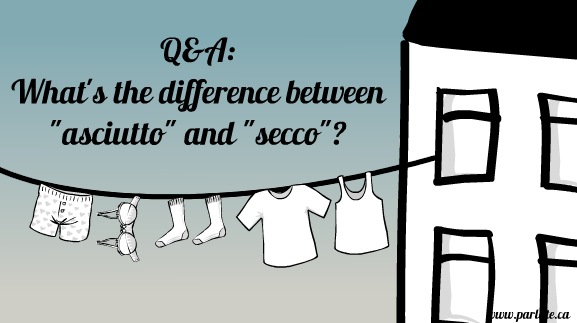Mirella Colalillo, 15 febbraio 2016
(English follows)
Entrambi gli aggettivi italiani “asciutto” e “secco” si usano per indicare che qualcosa è priva d’acqua o di umidità. In inglese, invece, esiste una sola parola, “dry”, e da qui nascono tanti dubbi. Quando usare l’uno o l’altro aggettivo?
Nel video illustro in maniera semplificata una regola valida in generale. Tuttavia, come sempre ci sono dei casi particolari in cui vengono utilizzati e un buon dizionario sarà di grande aiuto per scegliere l’aggettivo giusto anche per i vari usi figurativi.
Per esempio: “Un fisico asciutto” – a lean body; oppure “Lui è secco” – he’s skinny.
Sei rimasta a bocca asciutta? Are you speechless? Allora guarda il video e ti sarà chiaro! Se hai delle domande, fammi sapere nei commenti.
Alla prossima!
Mirella
Both Italian adjectives “asciutto“ and “secco“ are used to indicate that something is devoid of water or moisture. In English, however, there is only one word, “dry”, and many doubts arise from here. When to use one or the other adjective?
In the video I explain in a simplified form a rule that is valid in general. However, as always there are some special cases in which they are used and a good dictionary will be of great help to choose the right word for the various figurative uses.
For example: “Un fisico asciutto” – a lean body; or “Lui è secco” – he’s skinny.
Sei rimasta a bocca asciutta? Are you speechless? Then watch the video and it will be clear! If you have any questions, let me know in the comments.
Until next time!
Mirella
- La Pasqua nell’arte italiana
- Racconto italiano: La disdetta del frullato al cacao A2/B1
- Come si usa il gerundio
- Racconto italiano: La gatta sull’albero /A2
- Racconto italiano: Le scale al nuovo anno /B2
Improve your speaking and grammar while learning some Italian jokes!


